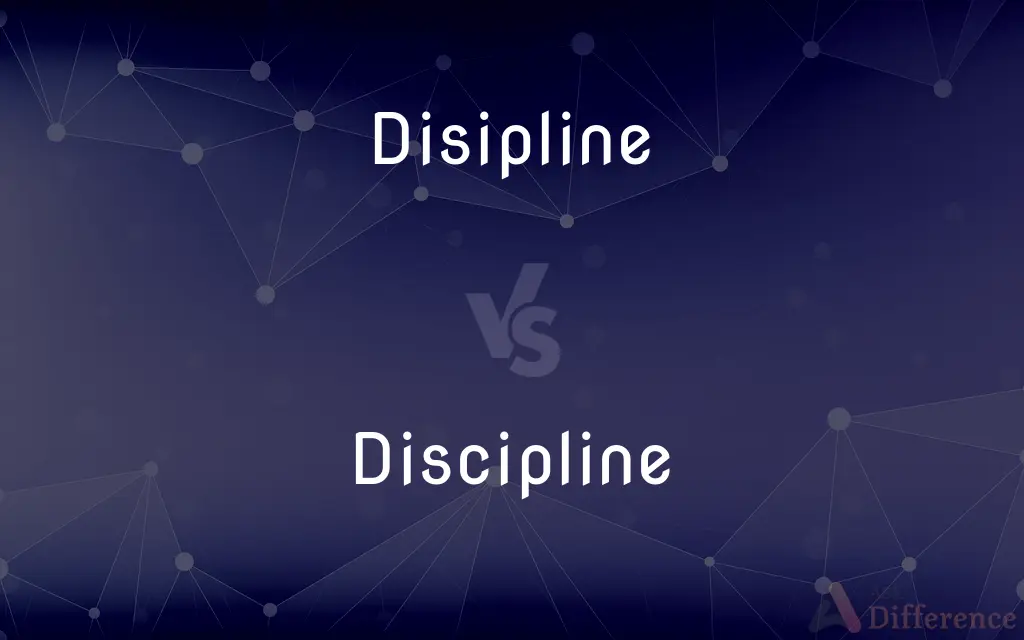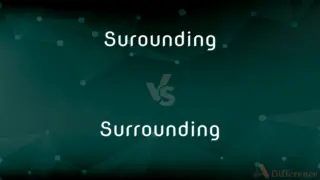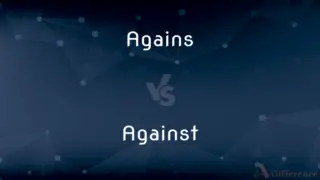Disipline vs. Discipline — Which is Correct Spelling?
Edited by Tayyaba Rehman — By Fiza Rafique — Updated on April 3, 2024
"Disipline" is an incorrect spelling, while "discipline" is correct. Discipline refers to controlled behavior or self-control.

Table of Contents
Which is correct: Disipline or Discipline
How to spell Discipline?

Disipline
Incorrect Spelling

Discipline
Correct Spelling
ADVERTISEMENT
Key Differences
Associate "discipline" with "pencil" – both have a ‘c’ before the ‘i’.
Recall that "discipline" has two 'c's and represents controlled conduct, emphasizing the ‘control’ element.
Think of the word "disc" at the beginning, which is spelled with a ‘c’.
Note that “disipline” is missing the spine of the word, the “c”.
Use mnemonic devices: "Dis-C-ipline keeps you in line."
ADVERTISEMENT
How Do You Spell Discipline Correctly?
Incorrect: He needs to work on his disipline if he wants to succeed.
Correct: He needs to work on his discipline if he wants to succeed.
Incorrect: Her lack of disipline in studying led to poor grades.
Correct: Her lack of discipline in studying led to poor grades.
Incorrect: Good disipline is essential for maintaining a healthy lifestyle.
Correct: Good discipline is essential for maintaining a healthy lifestyle.
Incorrect: The team's success is largely due to their strict training disipline.
Correct: The team's success is largely due to their strict training discipline.
Incorrect: Parents often struggle to find the right balance of disipline for their children.
Correct: Parents often struggle to find the right balance of discipline for their children.
Discipline Definitions
Discipline is a system of rules governing conduct.
The military has a strict discipline.
Discipline is the act of punishing someone to correct bad behavior.
The student faced discipline for cheating.
Training expected to produce a specific character or pattern of behavior, especially training that produces moral or mental improvement
Was raised in the strictest discipline.
Control obtained by enforcing compliance or order
Military discipline.
Controlled behavior resulting from disciplinary training; self-control
Dieting takes a lot of discipline.
A state of order based on submission to rules and authority
A teacher who demanded discipline in the classroom.
Punishment intended to correct or train
Subjected to harsh discipline.
A set of rules or methods, as those regulating the practice of a church or monastic order.
A branch of knowledge or teaching
The discipline of mathematics.
To train by instruction and practice, as in following rules or developing self-control
The sergeant disciplined the recruits to become soldiers.
To punish in order to gain control or enforce obedience.
To impose order on
Needed to discipline their study habits.
A controlled behaviour; self-control.
An enforced compliance or control.
A systematic method of obtaining obedience.
A state of order based on submission to authority.
A set of rules regulating behaviour.
A punishment to train or maintain control.
A specific branch of knowledge or learning.
A category in which a certain art, sport or other activity belongs.
(transitive) To train someone by instruction and practice.
(transitive) To teach someone to obey authority.
(transitive) To punish someone in order to (re)gain control.
(transitive) To impose order on someone.
The treatment suited to a disciple or learner; education; development of the faculties by instruction and exercise; training, whether physical, mental, or moral.
Wife and children are a kind of discipline of humanity.
Discipline aims at the removal of bad habits and the substitution of good ones, especially those of order, regularity, and obedience.
Training to act in accordance with established rules; accustoming to systematic and regular action; drill.
Their wildness lose, and, quitting nature's part,Obey the rules and discipline of art.
Subjection to rule; submissiveness to order and control; habit of obedience.
The most perfect, who have their passions in the best discipline, are yet obliged to be constantly on their guard.
Severe training, corrective of faults; instruction by means of misfortune, suffering, punishment, etc.
A sharp discipline of half a century had sufficed to educate us.
Correction; chastisement; punishment inflicted by way of correction and training.
Giving her the discipline of the strap.
The subject matter of instruction; a branch of knowledge.
The enforcement of methods of correction against one guilty of ecclesiastical offenses; reformatory or penal action toward a church member.
Self-inflicted and voluntary corporal punishment, as penance, or otherwise; specifically, a penitential scourge.
A system of essential rules and duties; as, the Romish or Anglican discipline.
To educate; to develop by instruction and exercise; to train.
To accustom to regular and systematic action; to bring under control so as to act systematically; to train to act together under orders; to teach subordination to; to form a habit of obedience in; to drill.
Ill armed, and worse disciplined.
His mind . . . imperfectly disciplined by nature.
To improve by corrective and penal methods; to chastise; to correct.
Has he disciplined Aufidius soundly?
To inflict ecclesiastical censures and penalties upon.
A branch of knowledge;
In what discipline is his doctorate?
Teachers should be well trained in their subject
Anthropology is the study of human beings
A system of rules of conduct or method of practice;
He quickly learned the discipline of prison routine
For such a plan to work requires discipline
The trait of being well behaved;
He insisted on discipline among the troops
Training to improve strength or self-control
The act of punishing;
The offenders deserved the harsh discipline they received
Train by instruction and practice; especially to teach self-control;
Parents must discipline their children
Is this dog trained?
Punish in order to gain control or enforce obedience;
The teacher disciplined the pupils rather frequently
Discipline refers to self-imposed control and order.
He exercised discipline in his daily habits.
Discipline is the act of training or teaching someone to obey rules.
Parents discipline their children to teach them right from wrong.
Discipline is a branch of knowledge or learning.
Physics is a discipline of science.
Discipline Meaning in a Sentence
Discipline is key to achieving your goals.
The discipline of waking up early has improved my productivity.
Military discipline is very strict and structured.
The teacher is known for maintaining discipline in her classroom.
Parents use various methods to teach their children discipline.
The discipline of meditation has many health benefits.
Learning discipline at a young age can lead to lifelong success.
Financial discipline is essential for saving money.
Without discipline, it's easy to stray from your diet.
The new coach instilled a sense of discipline in the team.
It takes discipline to train for a marathon.
He admires the discipline of professional athletes.
The discipline required for martial arts is both physical and mental.
She practices the discipline of gratitude every morning.
Discipline is the bridge between goals and accomplishment.
Self-discipline helps him resist the temptation to spend all day playing video games.
Discipline in study habits leads to academic achievement.
A lack of discipline can lead to chaos in any organization.
The artist's daily discipline helped her complete her project on time.
Discipline is more about self-control than punishment.
School uniforms are often a part of school discipline policies.
Time management requires discipline.
Implementing discipline in your routine can reduce stress.
Common Curiosities
What is the root word of discipline?
The root word is the Latin "disciplina," meaning "instruction" or "knowledge."
Why is it called discipline?
The term "discipline" comes from the Latin "disciplina" meaning "instruction" or "knowledge," and relates to teaching, learning, and order.
What is the verb form of discipline?
The verb form of "discipline" is "discipline" or "disciplined" when used in the past tense.
What is the plural form of discipline?
The plural form is "disciplines."
Which conjunction is used with discipline?
Any conjunction can be used with "discipline" depending on the sentence. There isn't a specific conjunction exclusive to the word.
Which vowel is used before discipline?
Typically, the indefinite article "a" is used before "discipline."
Which article is used with discipline?
Both "a" (indefinite) and "the" (definite) can be used with "discipline" based on context.
What is the pronunciation of discipline?
Discipline is pronounced as "DIS-uh-plin."
Is discipline a vowel or consonant?
"Discipline" is a word, not a single letter. It contains both vowels and consonants.
What is the singular form of discipline?
The singular form is "discipline."
Is discipline an adverb?
No, "discipline" is not an adverb.
Is discipline a collective noun?
No, "discipline" is not a collective noun.
Which determiner is used with discipline?
Determiners like "the," "a," "this," "that," "my," "our," etc. can be used with "discipline."
What is the first form of discipline?
The first form (base form) is "discipline."
Which preposition is used with discipline?
Various prepositions can be used with "discipline," but "in" is common, as in "expert in a discipline."
What part of speech is discipline?
"Discipline" is a noun.
Is discipline a noun or adjective?
"Discipline" is primarily a noun.
Is discipline a countable noun?
Yes, especially when referring to a branch of knowledge (e.g., "various disciplines").
How many syllables are in discipline?
There are three syllables in "discipline."
What is another term for discipline?
Another term for discipline can be "control" or "order."
What is the opposite of discipline?
The opposite of "discipline" can be "disorder" or "chaos."
What is the third form of discipline?
The third form (past participle) is "disciplined."
Is discipline an abstract noun?
Yes, when referring to self-control or a system of rules, it's an abstract noun.
Is the word discipline is imperative?
No, "discipline" itself is not imperative; it's a noun. However, it can be used in an imperative sentence like, "Discipline yourself!"
What is the second form of discipline?
The second form (past simple) is "disciplined."
Is discipline a negative or positive word?
"Discipline" is neutral but often carries a positive connotation when associated with self-control and order.
Is the discipline term a metaphor?
Not inherently, but it can be used metaphorically in specific contexts.
How do we divide discipline into syllables?
Dis-ci-pline.
What is a stressed syllable in discipline?
The first syllable "Dis-" is stressed in "discipline."
How is discipline used in a sentence?
"Maintaining discipline in the classroom ensures a conducive learning environment."
Share Your Discovery

Previous Comparison
Surounding vs. Surrounding
Next Comparison
Agains vs. AgainstAuthor Spotlight
Written by
Fiza RafiqueFiza Rafique is a skilled content writer at AskDifference.com, where she meticulously refines and enhances written pieces. Drawing from her vast editorial expertise, Fiza ensures clarity, accuracy, and precision in every article. Passionate about language, she continually seeks to elevate the quality of content for readers worldwide.
Edited by
Tayyaba RehmanTayyaba Rehman is a distinguished writer, currently serving as a primary contributor to askdifference.com. As a researcher in semantics and etymology, Tayyaba's passion for the complexity of languages and their distinctions has found a perfect home on the platform. Tayyaba delves into the intricacies of language, distinguishing between commonly confused words and phrases, thereby providing clarity for readers worldwide.







































